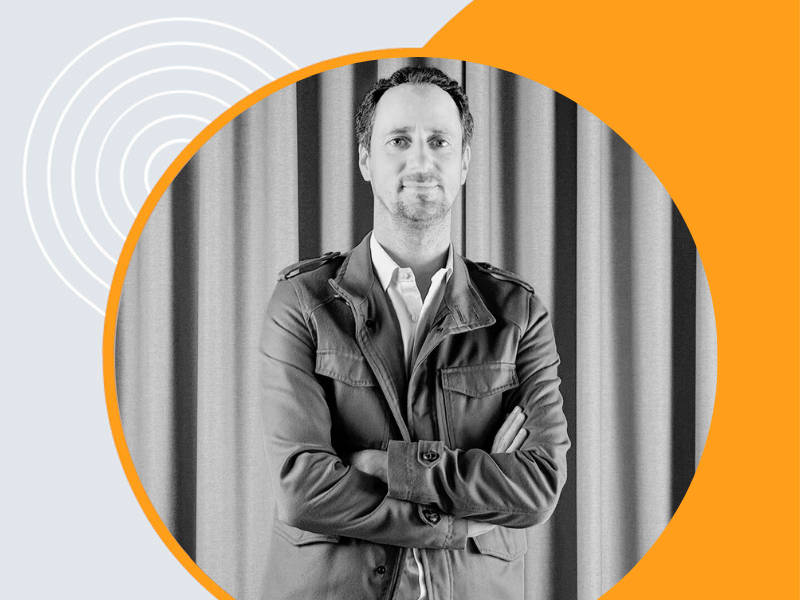Matteo Fabbrini, Faba
Curated by VSM Alumni, October 2025

Innovating to Educate: The Power of Ideas That Make Us Grow
Matteo Fabbrini, a graduate in Marketing and Business Management from the Department of Management – now Venice School of Management- at Ca’ Foscari University of Venice, is an entrepreneur and innovator who has successfully turned vision into impact.
In 2007, he founded Exclama, a company specialized in promotional items, and a year later he launched Maikii, which became a key player in the market of customized USB drives and accessories. With Maikii, he also launched the brand Tribe, developing collaborations with international licenses such as Star Wars, Marvel, and Disney.
In 2019, he launched FABA , a startup that combines education and entertainment through screen-free audio devices designed to stimulate children’s learning and creativity.
FABA quickly gained international recognition, reaching over 10 million euros in revenue in 2024 and winning the prestigious iF Design Award - a testament to its unique balance between technological innovation and educational values.
Recently, Matteo returned to class to engage with the next generation of managers, as part of Experior, a project of the Venice School of Management. This initiative offers students a unique opportunity to learn and be inspired through direct dialogue between academia and the business world.
In Matteo’s case, the Experior project took place within the course “Integrated Marketing Communication: Digital and Physical Touchpoints” , taught by Prof. Francesca Checchinato - where the dialogue between academia and business becomes a tangible opportunity for learning and inspiration.
Looking at your journey, how did your studies in Marketing at Ca’ Foscari help shape your approach to innovation and entrepreneurship? Is there something you still carry with you from that experience?
My experience at Ca’ Foscari was a fundamental stage for me, not only from an educational point of view but also on a human level. I came from an entrepreneurial family background, where I had been exposed to business since childhood, but university allowed me to acquire a more structured language, an analytical vision, and a critical mindset.
I particularly remember some courses that helped me reflect strategically, to understand the value of segmentation, positioning, and brand as an intangible asset.
But what I carry with me above all is the ability to think in systemic terms: to connect markets, trends, behaviors, and social dynamics. This lies at the core of every true innovation. In a world that changes so rapidly, curiosity and the ability to read between the lines — to catch weak signals — have perhaps become my most valuable resources, and it all started there, in the classroom, discussing cases, scenarios, and possibilities.
The idea of FABA was born to offer children an alternative to screens, focusing on listening, play, and imagination. When did you realize that this project could become a real business?
There were several moments that built that awareness. The first, without a doubt, was seeing my daughter — who had just been born at the time — interact with the product with surprising naturalness. It wasn’t just a toy, but an experience that created connection, emotional engagement, and stimulated her curiosity.
Then came the first feedback from parents, who didn’t just give us generic compliments but thanked us for offering their children a concrete alternative to screens.
Another turning point was the encounter with the market: at the first trade fairs we received much more attention than expected. The interest came not only from Italy but from different countries, which made us realize we were touching something universal. From there, a more structured reflection began on the business model, scalability, and growth potential. It wasn’t a sudden “click,” but a gradual awareness that the initial intuition could truly become a real company.
Creating a product for children requires great care in design, content, and the messages it conveys. How does a new character or story come to life at FABA, and what criteria do you follow to ensure it aligns with the brand’s values?
At FABA, every piece of content starts from a deep reflection on what we want the child to experience, learn, and feel. We never start from what “sells,” but from what educates, inspires, and stimulates. The question we always ask ourselves is: what value are we offering the child through this story or character?
Each new release is the result of teamwork involving very different figures: educators, psychologists, storytellers, illustrators, sound designers. Once the idea takes shape, a rigorous internal validation process begins: we evaluate the content from multiple perspectives — educational, linguistic, and ethical — also with the support of our committee of childhood experts.
The goal is to create a balance between entertainment and growth. For us, every product must reflect FABA’s core values: inclusion, empathy, respect for diversity, and encouragement of imagination. Children are demanding, even if they don’t know it yet: they sense authenticity, they recognize genuine messages. For this reason, if a piece of content doesn’t convey something true and positive, we simply don’t publish it.
Expanding a brand like FABA abroad requires strategic vision, cultural adaptation, and solid international marketing skills. Was there something you learned during your studies in management at Ca’ Foscari that helped you handle this phase of growth and internationalization?
Absolutely. At Ca’ Foscari, I learned that internationalization is not a linguistic translation, but a cultural one. I remember very clearly how much emphasis was placed on studying the local context, consumer habits, and the symbolic value of products in different markets. This approach proved essential when we decided to take FABA abroad.
Each country has a different sensitivity, especially when it comes to children and parenting. In some markets, the educational value is central; in others, the play dimension prevails. In certain contexts, people seek tradition; in others, innovation. The main lesson I carry with me is that of listening and intelligent adaptation: keeping the Italian heart of the brand, while being able to speak authentically to Spanish, French, and Belgian families. This balance between identity and flexibility has been one of the pillars that allowed us to grow without losing coherence.
Leading a fast-growing team, how do you build a strong corporate culture? What values do you try to transmit every day to the people who work with you?
Building a solid corporate culture requires time, consistency, and above all, example. I strongly believe in the concept of “leading by example”: you can’t ask for responsibility, creativity, or teamwork if you don’t live them yourself. Every day I try to convey the idea that, at FABA, everyone is an active part of a larger project and that each person’s impact truly matters.
Our culture is built around a few clear values: respect for childhood (which means care for every detail), mutual trust, listening, and a strong sense of purpose. We don’t work “to produce objects,” but to create experiences that help children grow better. And everyone must feel that — from marketing to logistics.
In times of rapid growth, it’s easy to lose focus; that’s why we work constantly on internal communication, storytelling, transparency, and inclusion. A culture is not a slogan: it’s a shared daily practice.
What advice would you give to young VSM alumni who dream of founding a startup, especially in complex and competitive fields such as education or children’s entertainment?
My main advice is to start from a real and profound need. In fields like education or or kids’ entertainment, having a good idea isn’t enough: you need to step carefully into a delicate territory where you carry great responsibility. You need to respect both the children and those who guide them: parents, teachers, educators.
Then, you need humility: start small, gather real feedback, fail early and often. The metrics of success here are not only economic: they are impact, engagement, transformation. And above all, don’t rush. This is a sector where trust is built over time. Finally, surround yourself with people better than you. No one builds a company alone, and the best ideas often arise from open dialogue. If you work with passion, vision, and coherence, even in the most challenging sectors you can build something truly unique.
Matteo Fabbrini’s journey shows how passion, curiosity, and vision can turn an idea into a project capable of changing the rules of the game. His return to the Venice School of Management through the Experior project symbolically closes one circle and opens another: that of dialogue between generations, where those who have built enterprises with courage choose to share their experience to inspire those who are just beginning to imagine their own future.

